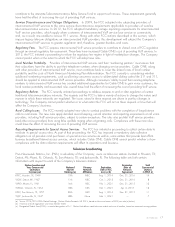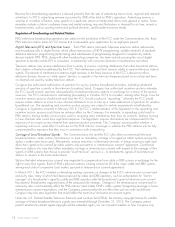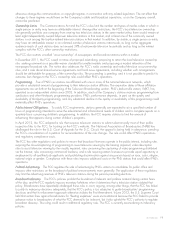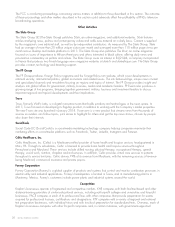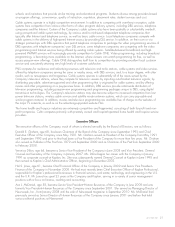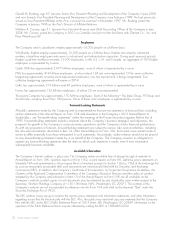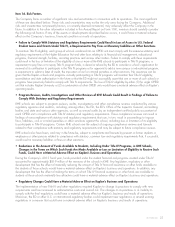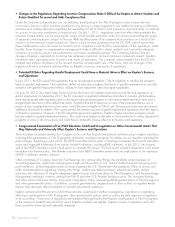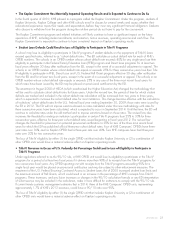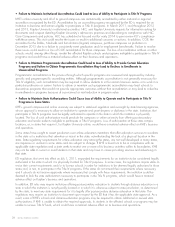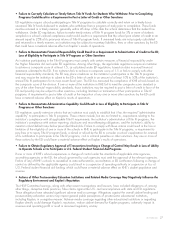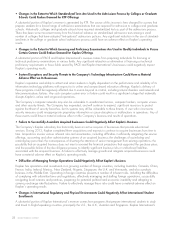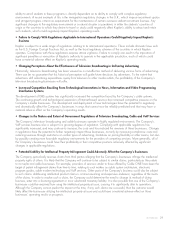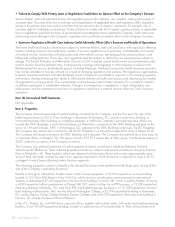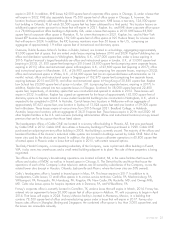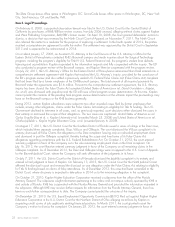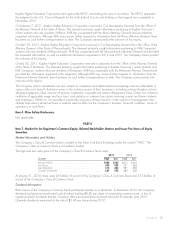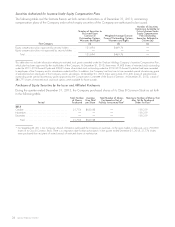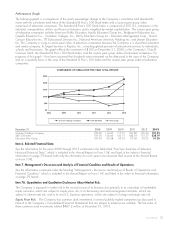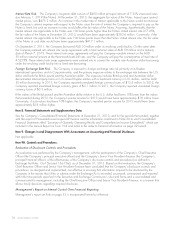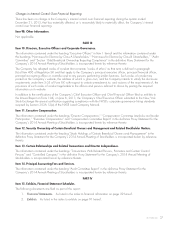Washington Post 2013 Annual Report Download - page 45
Download and view the complete annual report
Please find page 45 of the 2013 Washington Post annual report below. You can navigate through the pages in the report by either clicking on the pages listed below, or by using the keyword search tool below to find specific information within the annual report.• Failure to Correctly Calculate or Timely Return Title IV Funds for Students Who Withdraw Prior to Completing
Programs Could Result in a Requirement to Post a Letter of Credit or Other Sanctions
ED regulations require schools participating in Title IV programs to calculate correctly and return on a timely basis
unearned Title IV funds disbursed to students who withdraw from a program of study prior to completion. These funds
must be returned in a timely manner, generally within 45 days of the date the school determines that the student has
withdrawn. Under ED regulations, failure to make timely returns of Title IV program funds for 5% or more of students
sampled in a school’s annual compliance audit could result in a requirement that the school post a letter of credit in an
amount equal to 25% of its prior-year returns of Title IV program funds. If unearned funds are not properly calculated
and returned in a timely manner, an institution may be subject to monetary liabilities, fines or other sanctions by the ED
that could have a material adverse effect on Kaplan’s results of operations.
• Failure to Demonstrate Financial Responsibility Could Result in a Requirement to Submit Letters of Credit to the ED,
Loss of Eligibility to Participate in Title IV Programs or Other Sanctions
An institution participating in the Title IV programs must comply with certain measures of financial responsibility under
the Higher Education Act and under ED regulations. Among other things, the applicable regulations require an institution
to achieve a composite score of at least 1.5, as calculated under ED regulations, based on data in annual financial
statements submitted to the ED. If an institution fails to achieve a composite score of 1.5 or fails to comply with other
financial responsibility standards, the ED may place conditions on the institution’s participation in the Title IV programs
and may require the institution to submit to the ED a letter of credit in an amount of at least 10% to 50% of the institution’s
annual Title IV participation for its most recent fiscal year. The ED has measured the compliance of KHE schools based on
the composite score of the division. If one or more of the institutions in KHE fail to meet the composite score standard or
any of the other financial responsibility standards, those institutions may be required to post a letter of credit in favor of the
ED and possibly may be subject to other sanctions, including limitation or termination of their participation in Title IV
programs. A requirement to post a letter of credit or the imposition of any one or more other sanctions by the ED could
have a material adverse effect on Kaplan’s results of operations.
• Failure to Demonstrate Administrative Capability Could Result in Loss of Eligibility to Participate in Title IV
Programs or Other Sanctions
ED regulations specify extensive criteria that an institution must satisfy to establish that it has the required “administrative
capability” to participate in Title IV programs. These criteria include, but are not limited to, requirements relating to the
institution’s compliance with all applicable Title IV requirements; the institution’s administration of Title IV programs; the
institution’s compliance with certain reporting, disclosure and record-keeping obligations; and the institution’s ability to
maintain cohort default rates below prescribed thresholds. Failure to comply with these criteria could result in the loss or
limitation of the eligibility of one or more of the schools in KHE to participate in the Title IV programs, a requirement to
pay fines or to repay Title IV program funds, a denial or refusal by the ED to consider a school’s application for renewal
of its certification to participate in the Title IV programs, civil or criminal penalties or other sanctions. Any one or more of
these actions by the ED could have a material adverse effect on Kaplan’s results of operations.
• Failure to Obtain Regulatory Approval of Transactions Involving a Change of Control May Result in Loss of Ability
to Operate Schools or to Participate in U.S. Federal Student Financial Aid Programs
If one or more of KHE’s schools experiences a change of control under the standards of applicable state agencies,
accrediting agencies or the ED, the schools governed by such agencies must seek the approval of the relevant agencies.
Failure of any of KHE’s schools to reestablish its state authorization, accreditation or ED certification following a change of
control as defined by the applicable agency could result in a suspension of operating authority or suspension or loss of
U.S. Federal student financial aid funding, which could have a material adverse effect on KHE’s student population and
revenue.
• Actions of Other Postsecondary Education Institutions and Related Media Coverage May Negatively Influence the
Regulatory Environment and Kaplan’s Reputation
The HELP Committee hearings, along with other recent investigations and lawsuits, have included allegations of, among
other things, deceptive trade practices, false claims against the U.S. and noncompliance with state and ED regulations.
These allegations have attracted significant adverse media coverage. Allegations against the overall student lending and
postsecondary education sectors may impact general public perceptions of private-sector educational institutions,
including Kaplan, in a negative manner. Adverse media coverage regarding other educational institutions or regarding
Kaplan directly could damage Kaplan’s reputation, reduce student demand for Kaplan programs, adversely impact its
revenues and operating profit or result in increased regulatory scrutiny.
2013 FORM 10-K 27


